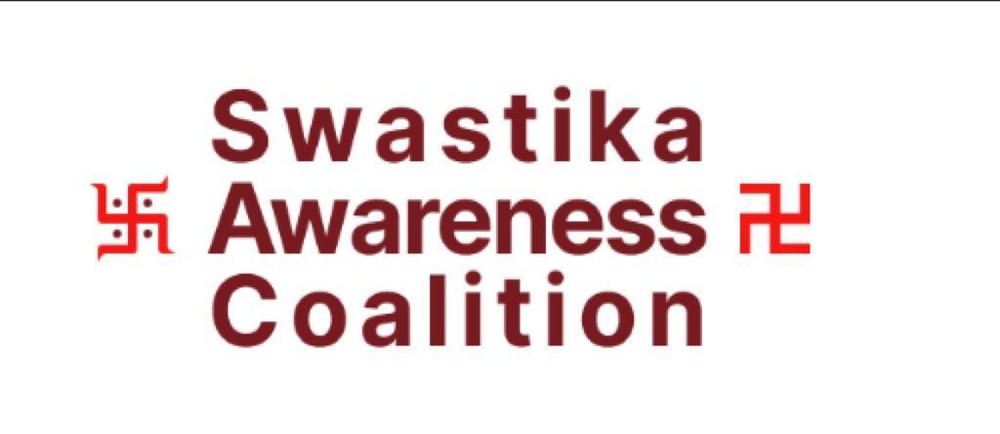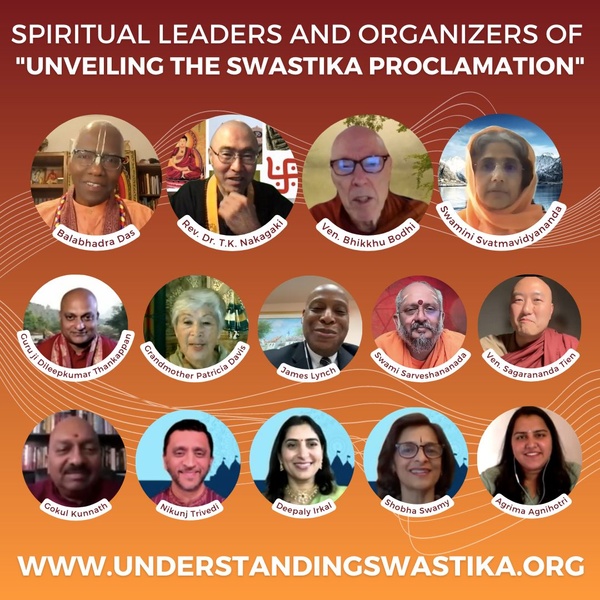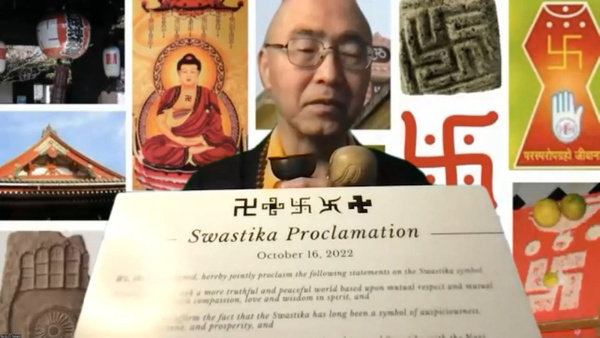Tuesday, Oct 18, 2022 Virtual: For the first time ever, an august gathering of spiritual leaders belonging to the Buddhist, Hindu and Native American traditions across the United States has made a strong and clarion call about the sacred Swastika symbol and asked the world to recognize the important distinction between this symbol and Hitler’s Hakenkreuz (“hooked cross”).
Issued on Sunday, October 16, the Swastika Proclamation acknowledges the suffering resulting from the genocide Jews, Roma and others and the impact of the usage of Hitler’s symbol of hate to dehumanize vulnerable members of society even today. However, the proclamation clarifies that, based on historical records, Hitler always called his symbol “Hakenkreuz” (German for “hooked cross”), while “Swastika” is a Sanskrit word and a sacred symbol of peace and well-being. By wrongly associating the sacred Swastika with Hitler’s Hakenkreuz, enormous harm is being done to more than 2 billion Hindus, Buddhists, Jains, Native Americans and other Indigenous people who continue to use the symbol with reverence and respect worldwide. The full text of the proclamation can be found here.
Signatories of the proclamation include prominent spiritual leaders such as Venerable Dhammadipa Sak, a trustee member of the Parliament of the World Religions, Poojya Swami Sarvapriyananda, the Head of the Vedanta Society of New York, Venerable Bhikkhu Bodhi, President of the Buddhist Association of the United States, Dr. TK Nakagaki, President Emeritus of the Buddhist Council of New York and the author of the Buddhist Swastika and Hitler’s Cross: Rescuing a Symbol of Peace from the Forces of Hatred, Poojya Swamini Svatmavidyananda, Interfaith Leader and Senior Disciple of HH Swami Dayananda Saraswati, Grandmother Mona Polacca, a Hopi/Havasuai/Tewa Elder and a member of the World Council of Religious and Spiritual Leaders, among others.
Venerable Bhikku Bodhi commended the efforts of the Swastika Awareness Coalition (SAC), which worked to create the proclamation and garner support across traditions who consider the symbol sacred, saying that the Swastika “is a symbol of blessings rather than a symbol of hatred” and that “by the truth of this proclamation may there be Suwatthi, may there be blessings, may there be well being, flourishing, safety, security and happiness.”
Echoing these sentiments, Poojya Swamini Svatmavidyananda shared that Swastika is “sacred geometry” and wished that the symbol would bring about universal harmony and peace.
Reverend Dr. T.K. Nakagaki remarked that, for him and others from Japan, Swastika symbolizes Buddhist temples on maps and the teaching of Buddha himself. He added that in Japanese, the Swastika is known as “Manji” (ten thousand virtues) while Hitler’s Hakenkreuz is known as “haakenkuroitsu.” “Both have a different meaning and different history. The right education is something important I believe,” concluded Dr. Nakagaki. “This Swastika Proclamation makes a clear distinction between Hakenkreuz and Swastika which is a very important aspect. Hopefully this (Swastika proclamation) will bring better understanding and more dialogue regarding the true information (about the two).”
Grandmother Patricia Anne Davis, a Native American Elder of the Choctaw-Navajo/Chahta-Dineh lineage affirmed her support for the proclamation, calling the event a “Reverent revolution that does not require us to overthrow anyone and does not require violence and suffering to bring about a change, the change is the reverence that we have for one another and others, we give up enemy creation, and we befriend language and culture that restores and revitalizes our spiritual oneness.”
Shri Balabhadra Das, an African American Hindu spiritual leader and a Direct Disciple of ISKCON founder HH A.C. Bhaktivedanta Swami, expressed great excitement about the proclamation and this historic event. “We have been a little too quiet about this. Now that we are speaking in one voice, I believe it will have a major impact, and I give my full support to this effort on behalf of the Vedic Friends Association. I am very proud of this effort.”
A formal spiritual ceremony followed, where Hindu, Buddhist and Native American chants officiated the proclamation and wished for the well-being and peace for all.
The proclamation has been signed so far by thirteen prominent North American spiritual leaders, along with over thirty organizations belonging to the Hindu, Buddhist, Jain and Native American traditions. More are expected to sign as they learn about this historic event and pledge their support - domestically and internationally.
For more information, please contact the Swastika Awareness Coalition at understandingswastika@gmail.com or visit www.understandingswastika.org.


